British Navy Seizes Smuggled Iranian Weapons In Gulf Of Oman
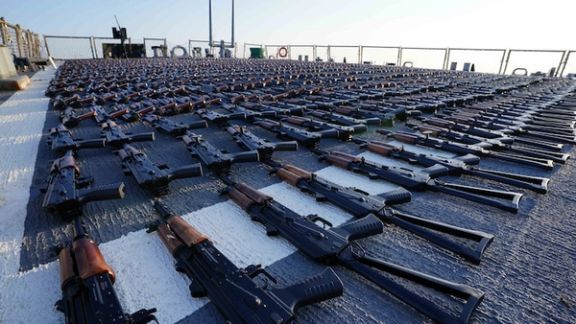
Britain's Royal Navy said Thursday it had seized Iranian weapons, including anti-tank guided missiles, last month from a smuggler’s vessel in the Gulf of Oman.

Britain's Royal Navy said Thursday it had seized Iranian weapons, including anti-tank guided missiles, last month from a smuggler’s vessel in the Gulf of Oman.
Britain said the vessel was detected travelling south from Iran at high speed during the hours of darkness by an unmanned US intelligence surveillance and reconnaissance plane in international waters, and was also tracked by a British helicopter.
When hailed by the Royal Navy, the vessel initially attempted to navigate to Iranian territorial waters but was stopped by a team of Royal Marines, who then boarded the small boat and recovered the suspicious packages, Britain's Ministry of Defense said.
"This seizure by HMS Lancaster and the permanent presence of the Royal Navy in the Gulf region supports our commitment to uphold international law and tackle activity that threatens peace and security around the world," British Defense Secretary Ben Wallace said in a statement.
Initial inspection suggested the packages included Iranian anti-tank guided missiles and medium-range ballistic missile components, Britain said, adding that it had informed the United Nations about the seizure.
It follows two previous Royal Navy seizures of Iranian weapons in the region early last year and several seizures by the US Navy or in joint operations since November.
UN experts have in the past made a determination that some weapons used by the Houthi forces in Yemen had Iranian origin.
Tehran has been supporting the Houthis at least for the past 8 years against Yemen's government and its backer Saudi Arabia.
With reporting by Reuters
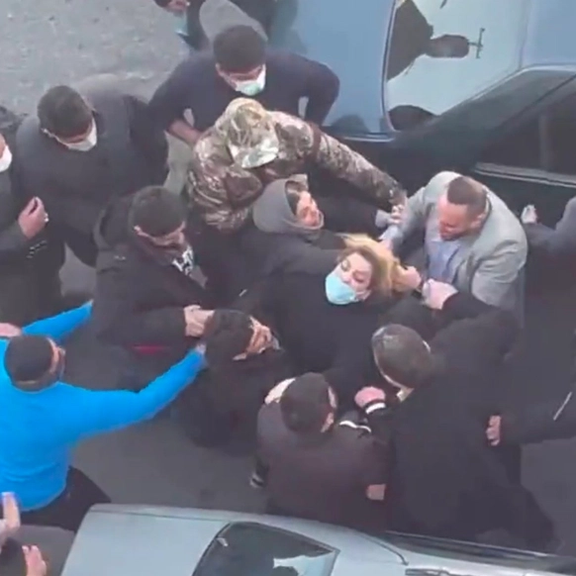
After the worst single day of gas poisonings in Iranian girls' schools, Washington has declared the issue “abhorrent" and called on authorities to put an end to the horror.
On Wednesday, almost 30 schools around the country saw hundreds of schoolgirls become the latest victims of an unknown gas being used in schools apparently to suppress support for the revolution.
In a briefing on Wednesday, State Department Spokesman Ned Price said the reports on the poisonings are both “disturbing” and “concerning”.
Hundreds of schoolgirls - who have been at the forefront of anti-regime protests - have been hospitalized in various cities across the country since November 30 when the first case of a mysterious poisoning was reported in the religious city of Qom.
Price called on the Iranian authorities to thoroughly investigate the poisonings. “It is incumbent on Iranian authorities to respond … [and] put an end to these reported attacks … [and] to hold accountable those who may be perpetrating this,” added Price.
He added: “Women and girls everywhere have an innate right to an education, and education is a universal human right. It is a right that women and girls in Iran should have … It is essential to advancing women’s economic security and to realizing gender equality.”
Interior Minister Ahmad Vahidi, a man wanted by Interpol for the bombing of a Jewish cultural center in Buenos Aires in 1994, said Wednesday that no chemical agent responsible for the poisonings has been found, and the culprits are yet to be apprehended.
He failed to address claims on social media that women dressed in strange attire had been seen walking into school campuses, suggesting a clear campaign to target the schools coming from regime officials.
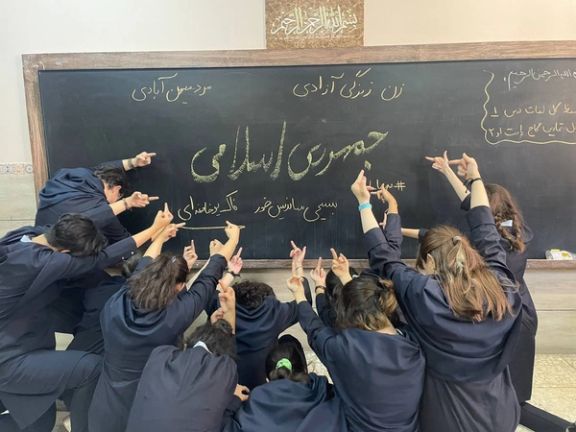
No one has been arrested three months after the first chemical attack on a girls’ school in Iran, amid a new spate of attacks affecting at least 26 schools Wednesday.
Interior Minister Ahmad Vahidi said at a press briefing Wednesday afternoon that so far no one has been arrested for the mysterious poisoning of girls at schools across the country and no chemical agent responsible for the poisonings has yet been found.
The IRGC-linked Fars News Agency had reported the arrest of three individuals earlier on Wednesday.
Vahidi who was assigned by President Ebrahim Raisi at the cabinet meeting Wednesday morning to urgently investigate the incidents also denied that the poisonings, apparently by toxic gases, have caused paralysis in any of the students. He claimed that the symptoms in over 90 percent of the students were induced by stress.

On Wednesday at least 26 more schools were attacked including over a dozen in the capital Tehran, six in Ardabil, two in Kermanshah, and one in Esfahan. In several cases security forces and police used violence against outraged parents who chanted slogans against authorities outside schools.
It is shocking for the public that the government has so far made no arrests or identified suspects, as well as providing extra security around schools. Later on on Wednesday, the United States urged Iran to investigate the poison attacks, a US State Department spokesperson said.
In a tweet Wednesday, prominent journalist Abbas Abdi said the attacks would have already ended if authorities had been as vehement to catch those responsible for the attacks as they are in silencing the poisoned girls’ families.
Children’s parents shouting “Death to the child-killing regime” and “Death to the Dictator” outside a girls’ school in Tehransar in a western suburb of Tehran.
Hundreds of schoolgirls have been hospitalized in various cities across the country since November 30 when the first case of a mysterious poisoning was reported in the religious city of Qom. Attacks have been widespread in Qom and Boroujerd in western Iran so far where tens of schools have been affected. The first attack in Tehran was reported Tuesday. Boys’ schools were attacked only in a few rare cases, including a primary school in Parand Town in the south of the capital, on Wednesday.
Authorities who at first dismissed the reports of poisonings in Qom and attributed the incidents to “children’s pranks” or other reasons including faulty heating, have now admitted that at least 1,200 students were affected by the mysterious fumes.
As many Iranians have said on social media that the attacks are the work of religious zealots who want to prevent girls from attending school, hardliners have tried to blame regime opponents.
Tehran municipality’s Hamshahri newspaper, a hardliner mouthpiece, dubbed the poisoning incidents “A Poisonous Project” and suggestively printed images of opposition figures including the former crown prince Reza Pahlavi, Mujahedin-e Khalq (MEK) leader Maryam Rajavi, and activist Masih Alinejad on its frontpage Wednesday. “By using the students’ poisonings, anti-revolutionaries are trying to cause anxiety among people,” the newspaper wrote.
Schoolgirls at a Tehran hospital Wednesday suffering from short breath and other symptoms including lethargy.
Prince Reza Pahlavi in a tweet Tuesday accused the regime of responsibility for systematic attacks on girls’ schools. Alinejad has also accused the regime and said it is taking revenge on schoolgirls for their participation in the Woman, Life, Freedom protests.
Many parents say on social media that they will not send their girls to school to keep them out of harm’s way but Alinejad has called on male students to boycott classes in their schools and universities on Saturday in support of schoolgirls.
State media and hardliners blame the MEK, which has a long record of terrorist attacks in Iran in the 1980s, more often than anyone else. “I have no doubt that the MEK or other hostile and anti-revolutionary groups are involved [in the poisonings],” lawmaker Ahmad Rastineh said Wednesday.
Another lawmaker, Mohammad-Tala Mazloumi, also blamed the MEK and similar groups, which he said aim to disgrace the Islamic Republic and its educational system, while also pointing a finger at Israel.
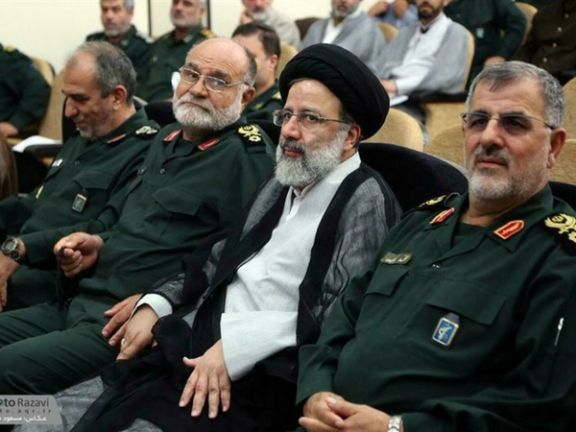
Iran’s parliament has approved legislation to allow the government to allocate 3 billion euros to the Armed Forces “to strengthen the country's defense infrastructure”.
Based on the legislation approved on Wednesday, the General Staff of the Armed Forces is allowed to export three billion euros worth of crude oil and oil products through small private refineries after the approval of the country's budget organization.
In the budget bill for the next Iranian year, starting March 21, the government had granted new permits to some departments such as the General Staff of the Armed Forces of the Islamic Republic to sell oil on behalf of the government and earn some of the income.
According to the Note 1 of the bill – titled “Oil and its relations with the government” -- the National Iranian Oil Company is obligated to deliver “crude oil and gas condensates” to entities introduced by the executive bodies. It means that the Armed forces can give crude oil to refineries and receive products that should be exported.
Iran, which is under US oil export sanctions has used this method before to make illicit oil shipments. However, in the past this has led to large corruption cases.
According to legal experts, this method of allocating money to government entities violates the constitution.
It remains unclear who and under what conditions will export the oil amid US sanctions. Many members of Iran's hardliner dominated parliament are former members of the IRGC.
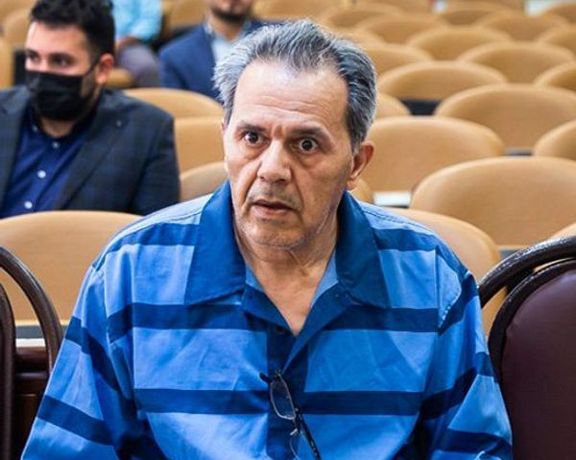
Iran’s judiciary has called a death sentence given to Iranian-German prisoner Jamshid Sharmahd, "just" because he "clearly confessed" to his crimes.
Masoud Setayeshi, the Judiciary Spokesman, said the sentence was “fair”, alleging he was "one of the most [dangerous] terrorists and anti-human elements whose hands are stained with the blood of dozens of people". He is one of dozens of dual nationals held hostage in Iran, subjected to unfair trial and paraded on the world stage.
Sharmahd was kidnapped by agents of the Islamic Republic during a trip to Dubai in the United Arab Emirates in August 2019.
He is accused by Tehran of heading a pro-monarchist group blamed by the government for a deadly 2008 bombing and of planning other attacks in the country.
Following last week's announcement of the death sentence, Berlin has since declared two diplomats at the Iranian embassy 'personae non gratae' and ordered them to leave the country. Nasser Kanaani, the Spokesman of Iran’s Ministry of Foreign Affairs, Wednesday announced that Tehran has also expelled two German diplomats.
Kanaani claimed that the German ambassador in Tehran has been summoned to reassure him that "the Islamic Republic will act decisively” on the matter. He also threatened that if Western powers "ignore the fundamental standards and Iran’s national sovereignty", the Islamic Republic will use "alternative options".
According to the secretary of Iran's High Council for Human Rights, the death sentence issued to Sharmahd "could be appealed".
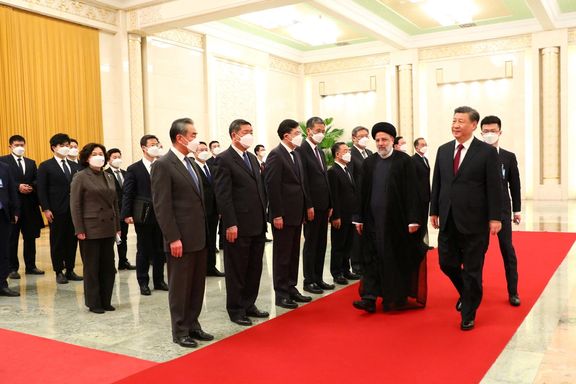
As Iran moves closer to Russia and China, leading Iranian lawmakers and pundits have warned the government against over-reliance on Moscow and Beijing.
Speaking to Shafaqna, conservative lawmaker Mostafa Hosseini Ghotbabadi said that while Iran publicly claims to have a “neither East nor West” approach to foreign policy, it is going too far towards relying on the East at the expense of total alienation from the West.
He said Russia’s war against Ukraine and conflicts between China and Taiwan are calculated games engineered by the world’s biggest powers over securing their share of the world’s resources, luring Iran and its neighbors into the game and distracting Iran from its priorities.
He claimed that big powers use Iran to scare the Persian Gulf states and sell weapons to them and plunder their resources.
Iran, ruled by Ali Khamenei, a staunch anti-West cleric has drawn closer to Russia in recent months, supplying drones and possibly other weapons for Moscow's war against Ukraine. It has also been trying to expand economic ties with China, but Beijing has been cautious in the light of American economic sanctions on Iran.
Foreign policy expert, Diako Hosseini, writing in reformist daily Shargh, said “Iran should not fall victim to the rivalry between China and the United States”, the world in “a transitional period marked by instability … [which is] shaping a new international order”. The revival of Russia after the collapse of Communism and China’s economic success, he says, has jeopardized the United States’ vision to become a singular world power.
“The United States is not merely concerned about China’s growth, it is also worried about China’s expanding ties with the world,” he said, including its ties with Iran, which has a key strategic location between East and West.
Putting restrictions on Iran also helps curb China's rise, Hosseini believes, the United States doing its best to prevent Iran from becoming part of the Russia-China axis. He said: “America’s current plan is to weaken Iran from within and isolate it in the international community. This can be part of a plan to once again create a unipolar world order.”
The new alliance of China and Iran could ultimately backfire, he warned, as it has for Russia. In the long run, Iran will not get concessions from America while its relations warm up with China and Russia and Iran must keep the doors of diplomacy with the West open.
Recently, prominent reformist figure Mostafa Hashemi-Taba, also writing in Shargh about Raisi’s visit to China, claimed that Iran is not capable of implementing an economic cooperation agreement with China as it does not have the administrative structure and manpower.
He also pointed out that the joint statement by China and Iran which was issued at the end of Raisi’s visit is indicative of Iran’s de facto recognition of Israel as for the first time in an official document Iran has used the word Israel rather than its usual jargon “the Zionist regime”.
Hashemi-Taba also pointed out that Iran’s dependency on China has the sole aim of attracting Chinese investment, given the dire economic crisis resulting from sanctions and the impasse on the JCPOA.
Meanwhile, In the United States, the Biden administration and European powers have also expressed deep concern over Iran’s growing military ties with Russia. They have said that a resumption of nuclear talks with Tehran is contingent on its change of policy in supplying weapons to Moscow.